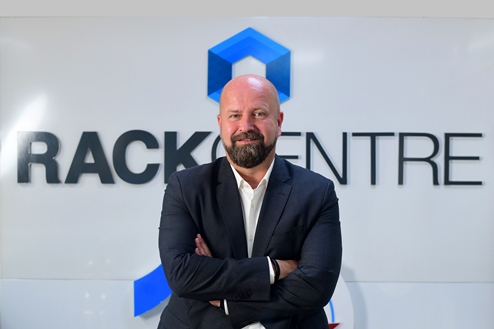FOCUS: CEOs Setting the Agenda for Nigeria’s Digital Economy
In an exclusive interview with IT Edge News, Lars Christer Johannisson, Chief Executive Officer of Rack Centre, an IFC Edge certified data centre operator, sheds light on the remarkable achievement of sustaining a 100% uptime for clients despite Nigeria’s power challenges. Johannisson delves into the factors driving the growth of the data centre sector, projecting a nearly 50% increase in capacity in the near future and discussing its implications for economic development in Sub-Saharan Africa. He also explores the critical issue of Nigeria’s digital divide and its impact on both new opportunities and the high threshold costs required to bridge this gap.
How does Rack Centre address the challenges related to power availability and reliability, and what measures are implemented to ensure uninterrupted power supply to its data centres?
In an industry and country where power is both a critical success factor and a limited source, everything we do at Rack Centre or any data centre in Nigeria, becomes a “Power availability and reliability” question. I do believe it boils down to, the 3 P’s; Planning, Processes and People. Rack Centre, since inception in 2013, has managed this reality with a 100% uptime for our clients, also ensuring continuous re-assessment.
RELATED: Rack Centre is first IFC EDGE certified data centre in Europe, Middle East and Africa
As we expand to become one of the largest data centres in Nigeria, we have designed our new facility with the same expectation for uptime, redundancy, efficiency and resiliency. We are autonomous in power generation with gas turbines, diesel engines, enhanced by PV and redundant in all categories. More so, we are IFC Edge certified and take pride in having a designed PUE on par with the most efficient data centre in Sub-Saharan Africa.
Regulatory compliance is crucial in the data centre industry. How does Rack Centre ensure adherence to local and international regulations, and what steps are taken to maintain compliance while providing innovative data centre solutions to clients?
Regulatory and compliance are inherent key attributes of any data centre. Rack Centre and the industry on a whole works very closely with all relevant certification bodies and in our case, NCC or similar government regulatory bodies in Nigeria. It is mandatory. But I also think the question drives demand, because decisions and regulations impact the planning scenarios especially around energy efficiency, data sovereignty, telecom competitive landscape and the broader Nigerian digital agenda.
We are autonomous in power generation with gas turbines, diesel engines, enhanced by PV and redundant in all categories. More so, we are the only IFC Edge certified facility in Europe, Middle East and Africa.
Can you discuss some of the innovative technologies and solutions implemented by Rack Centre to enhance the capabilities and reliability of its data centres, and how these innovations contribute to meeting the evolving needs of clients in Nigeria and beyond?
As an example, our upcoming 12 MW facility in Lagos is designed according to most efficient global standards for a very low PUE in Nigeria. Additionally, we know that AI will drive the energy consumption almost seven times versus a traditional non-AI enabled data centre. Our LGS2 facility is hyperscale ready and we have already considered absorbing this growing energy need and capacity over the next few years…. A concept we like to refer to as: “Build for today, Ready for tomorrow”.
What strategies does Rack Centre employ to cultivate local talent and develop the necessary skills within its workforce?
Rack Centre’s growth and operational excellence stands on the shoulders of our staff. We invest heavily in our staff and operational resources, which makes us an attractive employer of highly skilled talent, helping us retain a lot of knowledge and experience within the company. Additionally, we align our CSR strategy around Nigeria’s digital transformation agenda, where developing skills and competencies is crucial.
As we evolve, Rack Centre will continuously utilize emerging technologies to improve our service offerings to our clients.
Emerging technologies such as edge computing and artificial intelligence are reshaping the landscape of data centre operations. How is Rack Centre leveraging these emerging technologies to optimize data centre performance, enhance security measures, and deliver value-added services to clients?
On the demand side, emerging technologies, data inclusion and cloud-based services, drive our industry growth and on the other side, AI and new technologies make it feasible to enhance our operations to be more efficient and resilient. We already now see that the thousands of data points that we have in our data centre can be improved by AI extensions and data analytics. As we evolve, Rack Centre will continuously utilize emerging technologies to improve our service offerings to our clients.
What are your insights into the future prospects of the data centre industry in Nigeria, considering factors like increasing demand for digital services and evolving technology trends?
Sub Saharan Africa is home to only 2% of global Data centres in the world (a similar capacity of Switzerland today), out of which 50% are located in South Africa. The demographics of Nigeria, cloud service adoption, mobile/broadband penetration, data sovereignty, and low latency application are estimated to provide a CAGR of 12% in our business over the next few years. This means that right now, our sector looks at a planned capacity increase of almost 50 % in the near future. In Sub Saharan Africa, there is still a digital divide and lack of access to technology which defines the opportunity but also captures a high threshold cost to improve it. Fibre access/coverage, device, data costs and resilience, make subscribers transition from e.g. 2/3G to 4G a bit slower in Sub Saharan Africa. The good thing though is that between SMEs and the Public sector, almost 70% of these industry segments will shift to cloud services adoption over the next few years.





























